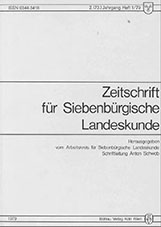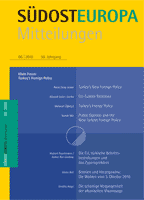
We kindly inform you that, as long as the subject affiliation of our 300.000+ articles is in progress, you might get unsufficient or no results on your third level or second level search. In this case, please broaden your search criteria.



Genealogical data on the histsory of Transylvanian migrations and on modifications of Saxonian self-consciousness
More...
Aus der Rede von Dr. Adolf Schullerus zum Entwurf der neuen rumänischen Verfassung in der Sitzung des rumänischen Senats (Oberhauses) am 12. März 1923 Extract from the speech of Dr. Adolf Schullerus on the Draft of the New ROmanian Constitution during the Session of the Romanian Senate on March 12, 1923
More...


reviews of: * Ernst Wagner: Historisch-Statistis.ches Ortsnamenbuch für Siebenbürgen. Mit einer Einführung in die historische Statistik des Landes. Köln Wien: Böhlau 1977. 526 pp. * Hermann Jekeli: Die Bischöfe der Evangelischen Kirche A. B. in Siebenbürgen. I. Teil: Die Bischöfe der Jahre 1553-1867. Köln Wien: Böhlau 1978 * Studien zur Geschichte der mitwohnenden Nationalitäten in Rumänien und ihrer Verbrüderung mit der rumänischen Nation. Die deutsche Nationalität. Band 1. Hrsg. vom Forschungszentrum für soziale Wissenschaften Sibiu [Hermannstadt], redigiert von Carl G öllner. Politischer Verlag, Bukarest 1976. 332 pp. * Aurel Lapadatu: Über die Genesis der rumänischen Agrargesellschaft bis zum Anfang des 18. Jahrhunderts. Anthropogeographische, ethnologische und geopolitische Faktoren. Rechtliche und sozialökonomische Bestimmungsgründe. C. Heymann, Köln: 1978 XV, 142 pp. * Johann Filstich: Tentamen historiae vallachicae. Incercare de istorie românească. Studiu introductiv, ediţia textului şi note Adolf Armbruster. Traducere Radu Constantinescu. [T. h. v. Versuch einer Geschichte der Walachei. Einleitung, Textausgabe und Anmerkungen A. A. Übersetzung R. C.]. Bukarest: Editura ştiinţifică şi enciclopedică 1979, 301 pp. * Enciclopedia istoriografiei româneşti. Coordonator ştiinţific Ştefan Ştefănescu. [Enzyklopadie der rumänischen Geschichtsschreibung. Wissenschaftlich koordiniert von Şt. Şt.]. Bukarest: Editura ştiinţifică şi enciclopedică 1978, 470 pp. * Endre Haraszti, The Ethnic History of Transylvania, 218 pp. Danubian Press Inc., Astor Park, Florida, 32002 (Danubian Research and Information Center) 1971. * David Prodan, Răscoala lui Horea, I-II. Bukarest: Editura ştiinţifică şi enciclopedică, 1979, 602 pp. (I), 766 pp. (II),
More...


the " Eygenlandrecht" is the "Statuta Iurium Municipalium Saxonum in Transilvania" from 1583
More...
Replica to the article: Stefan P a s c u , "Die Verwirklichung des rumänischen Nationalstaates" The Realisation of the Romanian Nation-State) in issue 2 (1978), pp. 170-180.
More...

In the past years, Turkey was able to readjust the relations it maintains to the states of its neighbourhood. Approaching regional security – be it on the Balkans, be it in the Middle East, be it in Central Asia – can no longer afford to disregard the strategic role being played by Turkey. However, Ankara’s declining relationship to the West raises serious doubt whether the country will really be able to position itself as a reliable partner on the global stage. The structural alienation between Tel Aviv and Ankara or Turkey’s hidden agenda on Iran, deliberately overriding US and European interests, illustrate the country’s emancipation from Western considerations. In the end, Turkey might be able to maintain a policy of regional leadership, especially in its Middle Eastern neighbourhood, however, such an approach goes to the disadvantage of its Western anchoring.
More...
The saga of the Albanian exodus to Europe is long and sometimes tragic. Since the collapse of communism in 1990, many Albanians headed towards different European countries searching for a better life. After the first big wave of refugees had subsided, the EU countries set strong rules for Albanians to enter. It was not easy to get a visa. Many Albanians tried the illegal way, often using the “visa mafia”, and failed. The difficult years of Albanian transition until the beginning of the new century regularly caused streams of refugees. In the last years, the improvement of law and order brought the country to stability and a visa-liberalisation process with the EU was initiated. Albania had to fulfill the requirements of the European Commission concerning travel documents, security, migration and border controls, law and order, reintegration of victims of human trafficking and returning emigrants, foreign affairs and human rights. On 15 September 2010, a Report of the European Commission, based on experts’ evaluation, gave Albania good grades for fulfilling these criteria and green light for visa-liberalisation. The last word came from the Council of the EU Interior Ministers at their meeting in November 2010. They sanctioned visa-liberalisation with Albania and Bosnia-Herzegovina by majority decision, opening the way for their people to travelling visa-free for 90 days in the Schengen zone by the end of 2010.
More...
Turkey has emerged as an important actor, as a consumer, transporter, investor, regional hub and security provider in energy geopolitics. Various recent energy deals Turkey has concluded are all adding to Turkey’s potential to expand its geostrategic weight. In this new landscape, Turks are increasingly acting in pursuit of their own self-interest rather than following the dictates from Washington or Brussels. On the basis of a thorough elaboration of these current and future trends the paper concludes with a number of policy recommendations for government and business leaders in promoting further cooperation and partnership rather than fanning confrontation in search of energy security for all players.
More...
Whereas Turkey’s foreign policy was traditionally considered to be a domain of the state, it has today – after eight years of AKP rule – become a subject for the public domain and an extension of domestic politics. Indeed, Turkey as a fast growing economy needs new markets and investment opportunities, a fact that necessitates an opening up to countries and regions previously neglected. While this is the main driving force behind the AKP’s new foreign policy, it is also true that the sentiments of the public, and the Islamic public in particular, are too evident in some of the choices made by the government. The author demonstrates these dynamics by looking at Turkey’s ties to Armenia, Israel, Syria and Iran. Thus, for example, Turkey’s growing ties with Iran are extremely popular among the AKP’s Islamic supporters, who admire the Iranian President Ahmedinejad. Ankara’s dealing with Iran’s nuclear pretentions has eventually left Turkey seriously at odds with the US and other Western allies. The author concludes that, while more democratic input in foreign policy administration may be positive in principle, political populism and opportunism can also change the orientation of countries and raise serious questions about where they are headed.
More...
In October 2010 the Bosnian peoples were asked to vote once again for a new state parliament, entity and cantonal parliaments as well as for the members for the Bosnian Presidency and the President of the Republika Srpska. While these elections resulted in a number of surprise gains by moderate candidates and parties, it is unlikely that the newly elected representatives will be able to overcome the political deadlock that has paralysed Bosnia over the last years. Too deep are the political cleavages between the parties and (more important) between the different ethnic groups and too little has been done by international actors including the European Union to push for reform and a consolidation of the state. While there is some hope that the radical rhetoric will calm down in the future, real progress and reform will need an active engagement of the EU, the USA and of Bosnia’s neighbours as well as its three constituent peoples (Bosniaks, Serbs and Croats). The key for future progress is an agreement on the nature and structure of the common state of Bosnia and Herzegovina among its constituent peoples.
More...

